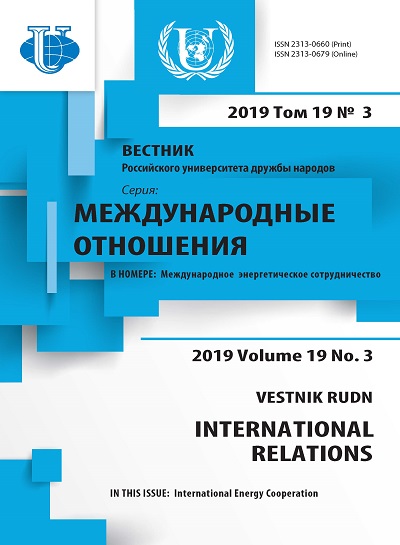Bilateral Relations between Germany and Saudi Arabia: Military-Political Dimension
- 作者: Trunov P.O.1
-
隶属关系:
- Institute of Scientific Information for Social Sciences of the Russian Academy of Sciences (INION RAS)
- 期: 卷 19, 编号 4 (2019): Islamic Factor in World Politics
- 页面: 663-674
- 栏目: 双方关系
- URL: https://journals.rudn.ru/international-relations/article/view/22845
- DOI: https://doi.org/10.22363/2313-0660-2019-19-4-663-674
- ID: 22845
如何引用文章
全文:
详细
Germany is an example of power, which is consistently trying to increase its role in global politics, including more active part in the solution of a wide range of military-political questions. At the same time Germany is facing the growing number of challenges for its own security, coming mostly from unstable Asian and African states. This makes Germany pay more attention on the Middle East in searching of new and strengthening traditional links with the regional partners. In this regard the article covers the dynamics, problems and perspectives of the bilateral interactions between Germany and Saudi Arabia in political-military sphere during the 2010s. Traditionally Saudi Arabia was one of the key partners of the ‘collective West’ in the Middle East and has had rather good relations with Germany. The key research method used in the article is the event-analysis. The research paper profoundly investigates the relations between Germany and Saudi Arabia during the first half of the 2010s. The article stresses the mutual interest in expanding and deepening cooperation in the context of the “Arab awakening”, including the solution of the Syrian problem. The key focus is paid to the growing discrepancies in positions of two parts regarding the Yemen conflict resolution in the context of confrontation between Saudi Arabia and Iran. The article also describes the dynamics of negotiations between Germany and Saudi Arabia on the highest and high levels in the middle 2010s. The paper points out the growing recession periods in German-Saudi relations in 2016-2017 (taken into account the execution of Shiite preachers in KSA; Qatar diplomatic crises and the assassination of J. Khashoggi). After the signature and implementation of the Iranian ‘nuclear deal’ Germany has been increasingly inclined towards the tactics of “balancing” between Iran and Saudi Arabia. And in this regard has emphasized the unacceptability of a direct military conflict between them. After Trump’s administration withdrawal from Iranian nuclear deal the article stresses the tougher German pressure on Saudi Arabia both in militarytechnical cooperation and political spheres in order to assure the withdrawal of Saudi Arabian military forces from Yemen. In the conclusion the author specifies the politicization of the bilateral military-technical cooperation and the sharp increase of the influence of Iranian factor over the German-Saudi relations. Three scenarios of future development of the confrontation between two states are proposed. Depending on each of them, the prospects for the development of German-Saudi relations are defined.
作者简介
Philipp Trunov
Institute of Scientific Information for Social Sciences of the Russian Academy of Sciences (INION RAS)
Email: 1trunov@mail.ru
PhD in Political Sciences, Senior Researcher, the Department of Europe and America, INION RAS; Senior Researcher, the Laboratory “Institutional History of the 21st century” Moscow, Russian Federation
参考
- Asseburg, M. & Kaim, M. (2018). Ein deutscher Militäreinsatz in Syrien Politische Ziele, Umsetzbarkeit, rechtliche Voraussetzungen, Effekte. SWP-Aktuell, 54. (In German)
- Asseburg, M., Lacher, W. & Transfeld, M. (2018). Mission Impossible? Berlin: Stiftung Wissenschaft und Politik, German Institute for International and Security Affairs
- Baikonyi, J. & Jakobeit, C. (2007). Internationale Kriminalitat / internationaler Terrorismus. In: Schmidt, S., Hellmann, G. & Wolf, R. (Eds.). Handbucg zur deutschen Aussenpolitik. Wiesbaden: Verlag fuer Sozialwissenschaften. S. 660-671. (In German)
- Gareis, S. (2006). Handbuh Militaer und Sozialwissenschaften. Opladen: Verlag Barbara Budrich. (In German).
- Kaldor, M. & Rangela, I. (Eds.). (2014). The Handbook of Global Security Policy. Sussex: Willey Blackwell.
- Leemhuis, R. (2018). Iran’s Destructive Regional Policy. An Underrated Problem. Bundesakademie für Sicherheitspolitik. Security Policy Working Paper, 27.
- Lohmann, S., Meier, O. & Zamirirad, A. (2017). Irans Atomprogramm: Washington und Brüssel auf Kollisionskurs Warum die EU die Atomvereinbarung retten muss. Juli, 53. (In German).
- Meiers, Fr.-J. (2016). Bundeswehr am Wendepunkt: Perspektiven deutscher Aussen und Sicherheitspolitik. Opladen: Springer Verlag. (In German).
- Noll, J. & Roll, St. (2015). Vom Jemen-Krieg zur gemeinsamen Armee? SWP-Aktuell, 47. (In German).
- Roll, St. (2019). Ein Staatsfonds für den Prinzen. Wirtschaftsreformen und Herrschaftssicherung in Saudi-Arabien. Berlin: Stiftung Wissenschaft und Politik, Deutsches Institut für Internationale Politik und Sicherheit. (In German).
- Roos, U. (Eds.). (2017). Deutsche Aussenpolitik. Arenen, Diskurse und grudlegende Handlungsregeln. Opladen: Springer Verlag. (In German).
- Sailer, M. & Roll, St. (2017). Three Scenarios for the Qatar Crisis. SWP Comments, 25.
- Steinberg, G. (2017). Saudi-Arabiens Krieg im Jemen. SWP-Aktuell, 51. (In German).
- Steinberg, G. (2018). Muhammad Bin Salman Al Saud an der Macht. SWP-Aktuell, 71. (In German).
- Transfeld, M. (2017). Kein Stellvertreterkrieg im Jemen. SWP-Aktuell, 13. (In German).
- Von Bredow, W. (2006). Die Aussenpolitik der Bundesrepublik Deutschlands. Eine Einfuehrung. Wiesbaden:Verlag fuer Sozialwissenschaften. (In German).
- Von Bredow, W. (2015). Sicherheit, Sicherheitspolitik und Militaer. Wiesbaden: Springer Fachmedien. (In German).
- Von Bredow, W. (2017). Die Geschichte der Bundeswehr. Berlin: Palm Verlag. (In German).
- Von Krause, U. (2012). Die Bundeswehr als Instrument deutscher Aussenpolitik. Wiesbaden: Springer Verlag. (In German).
- Weber, A. (2017). Red Sea: Connecter and Divider. SWP Comments.
补充文件








